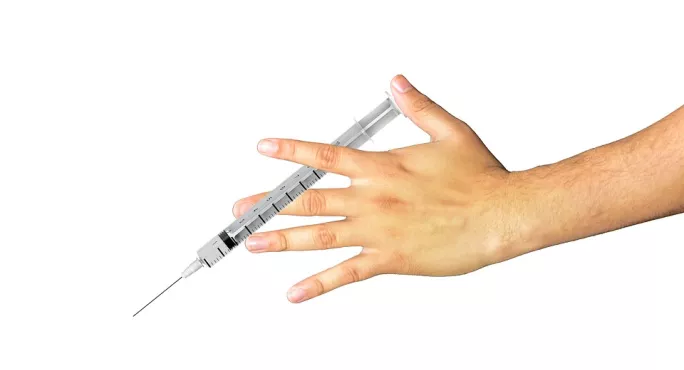- Home
- Experts question call to link school admission with MMR vaccine
Experts question call to link school admission with MMR vaccine

The UK should consider introducing compulsory measles vaccinations before children can start school, experts have said.
A team of Italian researchers warned that current vaccination policies are not enough to keep the disease at elimination status and control rising numbers of cases.
However, British experts cast doubt on the idea, saying enforcing vaccines could alienate parents.
Quick link: Health secretary doesn’t rule out banning unvaccinated pupils from school
Quick link: Teachers at risk of ‘one of the most infectious diseases’
Podcast: Ofsted, Sats and vaccinations
Researchers from the Bruno Kessler Foundation and Bocconi University in Milan looked at current vaccination trends in several countries, including the UK, Ireland, Australia, Italy and the US.
They concluded that in order to keep the percentage of the population susceptible to catching measles under 7.5 per cent by 2050 - the level at which measles is regarded as eliminated - further action is needed.
Either far more people need to be vaccinated or a schools policy should be brought in, they said.
Their study, published in the journal BMC Medicine, found that an estimated 3.7 per cent of the UK population across all ages remained susceptible to measles in 2018.
But this figure is expected to rise by more than 50 per cent by 2050 if current vaccination policies remain the same.
The researchers said: “Our results suggest that most of the countries would strongly benefit from the introduction of compulsory vaccination at school entry in addition to current routine immunisation programmes.”
Co-author Dr Stefano Merler added: “In particular, we found that this strategy would allow the UK, Ireland and the US to reach stable herd-immunity levels in the next decades, which means that a sufficiently high proportion of individuals are immune to the disease to avoid future outbreaks.
“To be effective, mandatory vaccination at school entry would need to cover more than 40 per cent of the population.”
But British experts cast doubt on whether introducing a policy of compulsory vaccination would work.
Dr David Elliman, consultant in community child health at Great Ormond Street Hospital, and from the Royal College of Paediatrics and Child Health, said such a policy lacks evidence for the UK.
He said: “Only about 1 per cent to 2 per cent of UK parents refuse all immunisations. A larger proportion may have concerns that are readily addressed by healthcare professionals, while a significant number still have problems accessing appropriate family-friendly services.
“Introducing compulsory vaccination in this country might reduce the very high level of trust that people have in the NHS and prove counterproductive. It could even result in lower levels of vaccination.
“Before we even consider going down this route, we should ensure that we have efficient appointments systems and reminders and adequate numbers of well-trained staff, with time to talk to parents in family-friendly clinics.
“Compulsion may work in some countries, but it is not for us.”
Sonia Saxena, professor of primary care at Imperial College London, said: “Making vaccination mandatory might have unintended consequences.
“It risks disenfranchising parents and carers, as well as risking a rise in unvaccinated children being excluded from school - which could carry stigma for children whose parents do not comply.
“More effective approaches would include reminding parents and providers of upcoming and overdue immunisations, as well as educating and providing feedback to the doctors, nurses and healthcare staff providing vaccinations.”
In the UK, anti-vaccination groups have been blamed for some parents not vaccinating their children with the combined measles, mumps and rubella vaccine (MMR).
The Times reports that 250,000 teenagers and young adults were not given the MMR vaccine following the scare about the jab, while a further 365,000 children under 14 have not been inoculated.
Mary Ramsay, head of immunisation at Public Health England, told the paper that students starting university could be a chance for people to catch up on missed vaccinations.
She said: “Many students will register with a new GP when they move out to attend university. This point of registration is a good opportunity for GPs to ask about vaccine history and we’d encourage them to do so.”
Simon Stevens, chief executive of NHS England, has said “vaccine rejection is a serious and growing public-health timebomb”, and “social media firms should have a zero-tolerance approach” towards dangerous and inaccurate scare stories.
Health secretary Matt Hancock has also said he “wouldn’t rule out anything” when asked whether unvaccinated children should be banned from schools.
Children need two doses of the vaccine for protection, with the World Health Organisation (WHO) recommending 95 per cent coverage to achieve herd immunity to stop the disease spreading.
In the UK in 2017, there were 259 measles cases in England, rising to 966 in 2018.
In 2016 and 2017, uptake of the first dose of the MMR vaccine in five-year-olds in the UK exceeded 95 per cent. But uptake of the second dose of MMR in five-year-old children is 88 per cent - well below the 95 per cent WHO target.
Keep reading for just £1 per month
You've reached your limit of free articles this month. Subscribe for £1 per month for three months and get:
- Unlimited access to all Tes magazine content
- Exclusive subscriber-only stories
- Award-winning email newsletters



